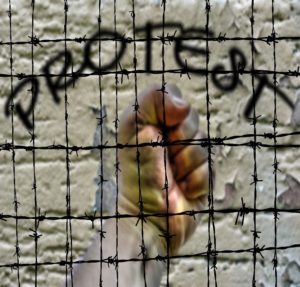slavery
 Common prison reform necessarily highlights the federal government’s smothering of inmates’ constitutional rights. The age-old patterns of violations of incarcerated persons are examples of legislative bullying designed to protect the security of prison officers and staff at the expense of inmates’ basic rights. Because prison communication to the outside is designed to hide behind the security of guards and staff,[1] the residual effect is but a hazy view into the lives of those held in the clutches of mass incarceration.… Read the rest
Common prison reform necessarily highlights the federal government’s smothering of inmates’ constitutional rights. The age-old patterns of violations of incarcerated persons are examples of legislative bullying designed to protect the security of prison officers and staff at the expense of inmates’ basic rights. Because prison communication to the outside is designed to hide behind the security of guards and staff,[1] the residual effect is but a hazy view into the lives of those held in the clutches of mass incarceration.… Read the rest
 The critical prison reform topic of jobs has been a recurring theme of my posts.[1] The topic brings into focus populations of people released from prison each year. In 2016, state and federal prisons released about 626,000 people, according to the U.S. Department of Justice’s Bureau of Justice Statistics.… Read the rest
The critical prison reform topic of jobs has been a recurring theme of my posts.[1] The topic brings into focus populations of people released from prison each year. In 2016, state and federal prisons released about 626,000 people, according to the U.S. Department of Justice’s Bureau of Justice Statistics.… Read the rest
 The prison conditions that led to the 1971 Attica prison uprising remain rife in today’s prisons. Overcrowding, poor healthcare, lousy food, racism, and poorly trained prison personnel churn within the caldrons of our prisons. Add to the brew elements of contrived inmate humiliation and shame, as well as lack of education and job training, and a single spark will blow the top off.… Read the rest
The prison conditions that led to the 1971 Attica prison uprising remain rife in today’s prisons. Overcrowding, poor healthcare, lousy food, racism, and poorly trained prison personnel churn within the caldrons of our prisons. Add to the brew elements of contrived inmate humiliation and shame, as well as lack of education and job training, and a single spark will blow the top off.… Read the rest

Let’s take a simple test about the scope of the Thirteenth Amendment to the US Constitution (ratified in 1865).
True or false: the Thirteenth Amendment prohibiting slavery applies to all people.
The correct answer is false.
The thirty-two-word Amendment states the following:
Neither slavery nor involuntary servitude, except as punishment for crime whereof the party shall have been duly convicted, shall exist within the United States, or any place subject to its jurisdiction.… Read the rest